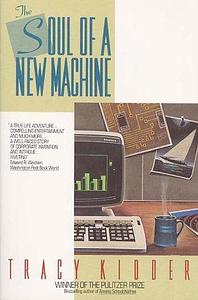Take a photo of a barcode or cover
I was just not fascinated enough by the pursiuts of a bunch of techbros to stick with it longer than 50 pages.
dark
informative
inspiring
medium-paced
You don't need to understand computers to enjoy the book. You will learn a huge amount about computing. It's exciting, not tedious.
funny
informative
inspiring
tense
medium-paced
The classic non-fiction tale of how a group of renegades, in a 'semi-authorized' skunkworks project at Data General, built a new 32-bit mini-computer in 1980 while the company's annointed team fell hopelessly behind schedule.
Sounds dull? Yes, but the book turns out to be anything but. This tale of nerds writing machine language and wrapping wire boards, along with the manager and his deputies who pieced together the team and somehow found a way to help keep them on track despite repeated setbacks and arduous debugging sessions, won a National Book Award and Pulitzer Price.
Vignettes from their struggles have kept popping back into my thoughts at various times over the last three years, during which our teams have been working on recurring, tight deadlines to develop a major new web-based software application.
Sounds dull? Yes, but the book turns out to be anything but. This tale of nerds writing machine language and wrapping wire boards, along with the manager and his deputies who pieced together the team and somehow found a way to help keep them on track despite repeated setbacks and arduous debugging sessions, won a National Book Award and Pulitzer Price.
Vignettes from their struggles have kept popping back into my thoughts at various times over the last three years, during which our teams have been working on recurring, tight deadlines to develop a major new web-based software application.
"In theory, a computer can mimic the behavior of anything. It can so so accurately only if the thing being imitated is thoroughly defined. So computers achieve only partial success, at best, when instructed to simulate the behavior of a city or to foresee the future of a national economy. Computers do well, however, when imitating other machines, including other computers--unbuilt ones that exist only on the paper of an architectural specification. You make the old computer imitate the new by writing a program. This program--the simulator--makes the existing computer respond to instructions just as the contemplated, unbuilt computer should. Essentially, your program translates instructions designed for the unbuilt computer into instructions that the existing one obeys. You can create a simulator that will make an old computer ape the behavior of the fanciest new computer you can imagine."
I was expecting and hoping to like this book, but I feel like it was fighting with itself between telling the story of the technology and telling a story about the people involved as characters. it's so crowded to keep track of. will be discussing it in class tomorrow. So we shall see.
I can see from a historical perspective why this won the PP, but it seems disjointed now. Knowing that it was on practically everyone's "Great Books in Computer History" lists, I expected it to be more global, not a 'deep dive' into a single company's development of a single machine. Still, very interesting.
Reading the book felt like a chore. I couldn't bring myself to care for any of the characters nor for the project they were working for. It is not so much that the subject matter feels dated but rather that the presentation style left me feeling like an outsider.
I have an old paperback copy of this - read many times before.
Having just completed a fourth project management class, I'm trying to see the intersection of that discipline with what is described in this book.
There is more detail about how computers work in this book than most people understand now with computers that are far far more complex (or so it seems to me). I don't think anything like this could be written now. Amusingly, when done reading the book, you have no idea what the computer they produce is useful for.
Having just completed a fourth project management class, I'm trying to see the intersection of that discipline with what is described in this book.
There is
Too me a long time to finish as I didn't find the details of hardware debugging enthralling.



